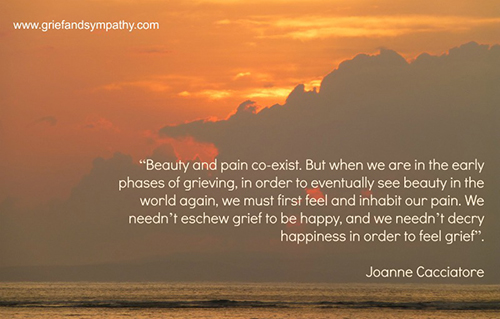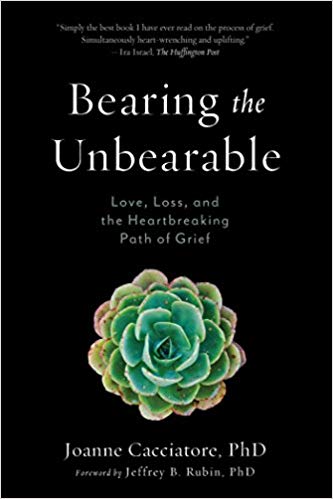Bearing the Unbearable by Joanne Cacciatore - A Major Step Forward in Helping Grievers
Joanne Cacciatore's book ‘Bearing the Unbearable - Love, Loss and the Heartbreaking Path of Grief’ is without doubt the most uplifting, painful and at the same time healing book I have read on grief since starting this website. If anyone had the required qualifications as a grief expert it would be Joanne Cacciatore. She writes from a place of personal experience as a bereaved mother, from a close connection to humanity, and from many years of researching bereavement in her role as Professor at Arizona State University, counseling the bereaved, and training other counselors. Read more about Joanne Cacciatore here.
Added to that, she writes like an angel. Her descriptions of grief are beautiful, poetic, moving, grounded in nature and unflinchingly honest.
It's a book that will send chills down your spine right to the last page. Don't expect to get through it without tears and without feeling. It will definitely help you to get in touch with those tough feelings but you will find ways to sit with them which are bittersweet and will lead to finding meaning and growth in life again. Joanne provides in these pages, a safe and understanding place to feel and be present with the pain of grief. She teaches us how to ‘do’ grief, rather than just ‘be’ with it.
Joanne shares her own powerful experiences of grief, as well as stories of some of those she has helped and how they found their way out of the maze of confusion and denial that is so often the grief experience most of us have.
She explores ways of making grief less terrifying - by personifying it - helping it become a friend to whom you can talk rather than an enemy to be feared. She demonstrates how it is possible to come to an acceptance of your grief, even if you never fully accept the actual loss. She describes the cathartic effects of just sitting with your grief, and the healing that can be generated by small, random acts of kindness.
One of the most powerful lessons of the book, I feel, is that beauty and pain can co-exist and that grief and gratitude or grief and joy are not mutually exclusive but can exist together.

“Beauty and pain co-exist. But when we are in the early phases of grieving, in order to eventually see beauty in the world again, we must first feel and inhabit our pain. . . . We needn’t eschew grief to be happy, and we needn’t decry happiness in order to feel grief”.
The story of Joanne’s rescue horse, Chemokah, is heart-rending, tear-jerking and a testimony to the power of animals to love and forgive. It is a story of what Cacciatore calls 'fierce compassion' born of grief and it inspired the creation of her retreat farm 'Selah' for those who are bereaved. There are many tragic stories in the book, but most of them lead to compassion and lives of service to others.
You will be in no doubt that Joanne Cacciatore is pretty unhappy with the way society and health practitioners treat grief. Grief has been swept under the carpet and neglected or medicalised. People are expected to hide their emotions and just ‘get over it’. This, according to Cacciatore, is one of the most damaging things we can do as a community. It leads to alienation, isolation, anger, ill health and at worst even violence.
For these reasons alone, this is an important book for all humanity. Those who are grieving and those who support the grieving. If we all read this book, the whole planet would benefit from an outpouring of unprecedented compassion and understanding that would result.
Related Pages:
Grieving Mindfully - the Joanne Cacciatore Way
Books on grief for loss of a child
Coping with the loss of a child
- Grief and Sympathy Home
- Bookstore
- Bearing the Unbearable Book Review






